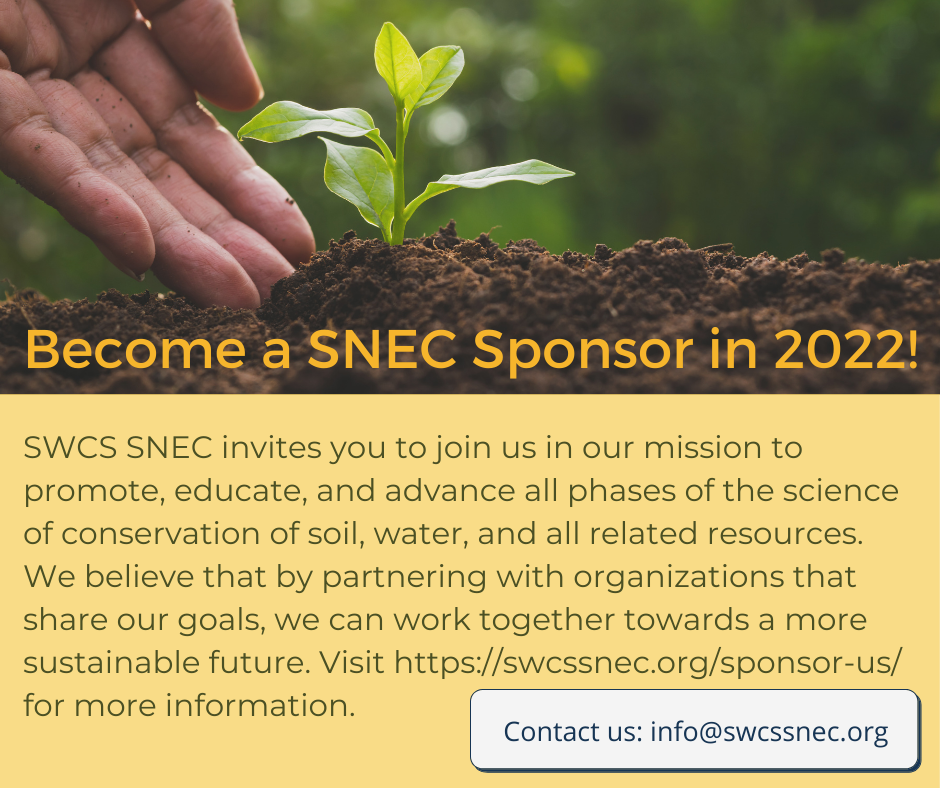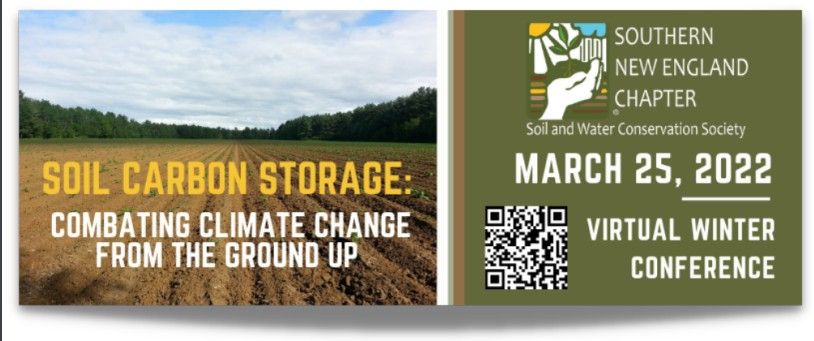A LETTER FROM OUR PRESIDENT: TIMOTHY RANDHIR

From headwaters to the coasts, we are dependent on soil and water to support our quality of life. With a growing population and increased impacts on these resources, we see the need for professional and strategic approaches to address these impacts. Soil loss, stormwater variability, wetland loss, nutrient
loss, farm yield management, urbanization, risk management, and climate change continue to be significant challenges facing the Southern New England (SNE) region. The SNE Chapter of the Soil and Water Conservation has been working to address these issues by bringing professionals, scientists,
managers, and citizens together as a regional chapter that serves Connecticut, Massachusetts, and Rhode Island.
With increased challenges posed by the pandemic in the past two years, our chapter has continued to serve members and the region through a hybrid method to deliver innovative topics and activities that greatly benefit communities. Our summer and winter meetings are well attended and have addressed emerging issues of professional interest. Our field events have engaged attendees in emerging soil and water technologies. In addition, our chapter supports future conservation leaders and youth through the sponsorship of programs like Envirothon and UMass Eco Graduate Symposium. All these are possible through our sponsors, and our chapter is grateful for the generosity and vision of sponsors towards enhancing soil and water conservation in the region. Our chapter is spearheaded by the excellent leadership of the board of directors, who spent countless hours making this chapter a success. I would also like to thank Renee Bouldin, who served many years as an executive director to enhance our chapter’s mission and joined the SWCS team at Ankeny. In addition, our new executive director Abigail Elder brings new ideas to our chapter, and we are fortunate to have such a great team of directors.
My best wishes on the new year, and our chapter is looking forward to serving the region in sustaining soil and water resources through innovative means and partnerships.
Sincerely,
Timothy Randhir, SWCS SNEC President
SWCS SNEC – JANUARY 2022 NEWSLETTER

SOIL CARBON STORAGE: COMBATING
CLIMATE CHANGE FROM THE GROUND UP
REGISTRATION IS OPEN!
Join soil scientists and environmental professionals from across New England on Friday, March 25th at SNEC’s annual Winter Conference. We are very pleased to announce Dr. Rattan Lal as our keynote speaker. Dr. Lal is a globally renowned soil scientist whose research ranges from regenerative agriculture, soil carbon sequestration, soil restoration, natural resource management, and global food security. Lal received the Glinka World Soil Prize in 2018, the World Food Prize in 2020, the Good Will Ambassador of IICA in 2020, and the Padma Shri Award in 2021.
Dr. Lal will be joined by several presenters representing all angles of soil conservation who will dive into topics like blue carbon, carbon credits, regenerative agriculture, soil productivity, and climate change regulations and mitigation. Participants of this year’s conference are eligible to receive continuing education credits and will also have the opportunity to network with other attendees. Click the link below to register today!
SNEC IS LOOKING FOR SPONSORS

Support from our sponsors helps us to continue hosting trainings and educational events for our network of conservation professionals. We are able to provide internships and mentoring opportunities for college students who are finding their path in the conservation field. Our sponsors also make it possible for us to participate in and support environmental education programs such as Envirothons and student symposiums.
A SWCS SNEC sponsor has priority access to the following:
- Job listings in our newsletters & social media platforms
- Use of SWCS SNEC social media to market educational opportunities/events (subject to
approval) - Ability to request specific trainings to help your staff in the future
- Brand exposure to current students, recent graduates, and folks at all stages of their career path
Do you know of an organization whose goals align with SNEC’s and would be interested in supporting environmental and conservation initiatives around southern New England? Please spread the word and feel free to contact info@swcssnec.org for more info! Thank you.
CONSERVATION COMMUNITY MEMBERSHIPS

There are two different levels of Conservation Community Memberships. The $230 level is aimed at Soil and Water Conservation Districts, university extension offices, local governments, and not-for-profits that serve a geographic area smaller than a state are eligible. The $500 level is aimed at qualifying not-for-profit organizations that serve a state or larger geographic region are eligible. This type of membership is great for organizations that would like to provide their employees with certain SWCS benefits and resources but don’t necessarily need each employee to obtain individual membership.
Benefits include special access to the Journal of Soil and Water Conservation, access to the private member directory, delivery of monthly membership newsletters and conservation news briefs, as well as discounted tickets to the SWCS Annual Conference, 20% off the SWCS online store, discounts on SWCS job board posts and more. Sarah Longenecker, a County Conservationist with the St. Joseph Soil and Water Conservation District says, “Our office-wide membership allows all the staff in our soil and water conservation district access to beneficial resources on national policy and scientific research as well as giving us access to local networking and professional development opportunities.”
For more information on becoming a conservation community member, please contact
memberservices@swcs.org. Individuals who would like to join as a member can do so online at
https://www.swcs.org/get-involved/join/.
CALL FOR PROPOSALS
The Regional Conservation Partnership Program (RCPP) promotes coordination of NRCS conservation activities with partners that offer value-added contributions to expand their collective ability to address on-farm, watershed, and regional natural resource concerns. Through RCPP, NRCS seeks to coinvest with partners to implement projects that demonstrate innovative solutions to conservation challenges and provide measurable improvements and outcomes tied to the resource concerns they seek to address.
JOB POSTING
Program Manager – Summer
Stewardship Internship
New Caanan, CT

STEWARDSHIP COORDINATOR
FALMOUTH, MA

UPCOMING EVENTS
MASSACHUSETTS ENVRONMENTAL
EDUCATION SOCIETY
MARCH 9 & 10, 2022

NORTHEAST FISH & WILDLIFE
CONFERENCE
APRIL 3-5, 2022



